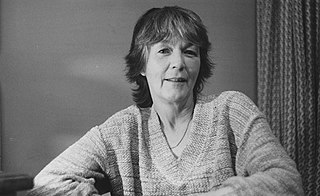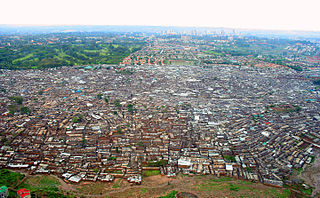Related Research Articles

Jean Sybil La Fontaine FRAI is a British anthropologist and emeritus professor of the London School of Economics. She has done research in Africa and the UK, on topics including ritual, gender, child abuse, witchcraft and satanism. In 1994 she wrote a government report: The Extent and Nature of Organised and Ritual Abuse.

Grace Emily Ogot was a Kenyan author, nurse, journalist, politician and diplomat. Together with Charity Waciuma she was the first Anglophone female Kenyan writer to be published. She was one of the first Kenyan members of parliament and she became an assistant minister.

Kibera is a division and neighbourhood of Nairobi, Kenya, 6.6 kilometres (4.1 mi) from the city centre. Kibera is the largest slum in Nairobi, and not only the largest urban slum in Kenya but also in Africa. The 2009 Kenya Population and Housing Census reports Kibera's population as 170,070, contrary to previous estimates of one or two million people. Other sources suggest the total Kibera population may be 500,000 to well over 1,000,000 depending on which slums are included in defining Kibera.

The University of Nairobi is a collegiate research university based in Nairobi and is the largest university in Kenya. Although its history as an educational institution dates back to 1956, it did not become an independent university until 1970. During that year, the University of East Africa was split into three independent universities: the Makerere University in Uganda, the University of Dar es Salaam in Tanzania, and the University of Nairobi in Kenya.

The Okiek, sometimes called the Ogiek or Akiek, are a Southern Nilotic ethnic group native to Tanzania and Southern Kenya, and Western Kenya. In 2019 the ethnic Okiek population was 52,596, although the number of those speaking the Akiek language was as low as 500.

Mathare is a collection of slums in Nairobi with a population of approximately 500,000 people; the population of Mathare Valley alone, the oldest of the slums that make up Mathare, is 180,000 people. Mathare is the home of football teams Mathare United and Real Mathare of the MYSA. Mathare is currently part of two electoral constituencies; the titular Mathare Constituency and the northern part being in Ruaraka Constituency. The northern part was initially part of Kasarani Constituency up to the 2013 elections when Kasarani was split into three electoral constituencies; Ruaraka being among them. The southern part was domiciled in Starehe Constituency.

Musimbi Kanyoro is a Kenyan-born human rights advocate, social activist and feminist theologian.
The following is a timeline of the history of the city of Nairobi, Kenya.
The following is a timeline of the history of the city of Mombasa, Coast Province, Kenya.
Son of Woman is a Postcolonial Kenyan crime fiction novel by Charles Mangua, which was first published in 1971 in Nairobi, Kenya. In a country struggling to reclaim identity, Mangua creates a character that is "returning to a homeland….using an available asset to begin a new career;" a character and story that resonates with the larger population.
Shining Hope for Communities (SHOFCO) is a grassroots movement based in Nairobi, Kenya in urban slums providing services, community advocacy platforms, and education and leadership development for women and girls. SHOFCO serves more than 350,000 urban slum dwellers in 10 slums across three cities in Kenya.
The African Studies Association of the United Kingdom (ASAUK) formed in 1963 "to advance African studies, particularly in the United Kingdom, by providing facilities for the interchange of information and ideas and the co-ordination of activities by and between persons and institutions concerned with the study of Africa." Antony Allott and Roland Oliver led the founding of the group. In recent times the Royal African Society administers the association.
Stellah Wairimu Bosire, is a Kenyan physician, corporate executive, human rights activist and author, a former co-executive director of Uhai Eashri and previously served as the chief executive officer of Kenya Medical Association and as the vice-chair of the HIV and AIDS Tribunal of Kenya.
Philomena Njeri Mwaura is a Kenyan theologian and an Associate Professor Religious Studies at Kenyatta University, Kenya. She has published widely in the areas of African Christianity- History and Theology and New Religious Movements.
Peninah Nthenya Musyimi is a Kenyan lawyer activist, who established the 'Safe Spaces' project, to empower young women who were growing up in the slums of Nairobi. The project draws on her own life experience as the first person from her neighbourhood in the Mathare Valley to graduate from university. In 2011, she was the recipient of Care International's "I am Powerful" award.

During the colonial occupation of Kenya, Black Africans working on farms owned by white settlers were called "squatters" by the British. As of 1945, there were over 200,000 such squatters in the Highlands and more than half were Kikuyu. The Mau Mau rebellion began amongst these squatters in the late 1940s and after independence in the early 1960s, peasants started squatting land in rural areas without the permission of the owner.
Mary Getui is a Kenyan theologian and professor of religious studies at the Catholic University of Eastern Africa. She is a founding member of the Circle of Concerned African Women Theologians. In 2009, Getui was named a Moran of the Burning Spear. She was appointed as chair of the National Aids Control Council of Kenya that same year.
John M. Lonsdale is a British Africanist and historian. He is Emeritus Professor of Modern African History at the Centre of African Studies in the Faculty of History at the University of Cambridge. He is a Fellow of Trinity College there. As a schoolboy, he spent three summer holidays during 1953-1956 in Kenya where his father had just taken a job. He read history at Cambridge from 1958 through 1964. In 1956 he started his national service as a subaltern in the King's African Rifles. His first teaching job was in Dar es Salaam in 1964. Lonsdale studied the modern history of Kenya extensively and won the Outstanding African Studies Award of the African Studies Association of the United Kingdom in 2006.

Kenneth James King is since September 2005 Professor Emeritus of International and Comparative Education at the University of Edinburgh. He is a historian, an Africanist and former Director of the Centre of African Studies (CAS) at Edinburgh. King obtained a Bachelor of Arts Classical Tripos from the University of Cambridge, and a Postgraduate Certificate in Education at the Institute of Education, London. He taught African History at a secondary school in Addis Abeba, Ethiopia, and earned a PhD degree in African history at the University of Edinburgh in 1968. He then worked at the University of Nairobi before returning to Edinburgh, where he was a Lecturer, Reader and Professor. In 1978 he was seconded for four years to the International Development Research Centre (IDRC) in Ottawa, Canada. Kenneth King and his wife Pravina King Khilnani were both presented with the 2011/2012 Distinguished Africanist Award of the African Studies Association of the United Kingdom (ASAUK). King has researched the small scale informal sector enterprises in Kenya over a 20-year period, and more recently studied India-Africa cooperation in human resource development, especially in Kenya, Ethiopia and South Africa, and China's aid policies towards Africa.
References
- 1 2 "Dr Nici Nelson MA PhD". gold.ac.uk. Goldsmith's University of London. Retrieved 18 August 2022.
Nici has published on urban anthropology, gender and development and approaches to development.
- ↑ "Outstanding African Studies Award". www.asauk.net/awards-prizes. African Studies Association of the United Kingdom. Retrieved 18 August 2022.
- ↑ "Nelson, Nici". Worldcat.org. OCLC . Retrieved 5 October 2024.
- ↑ Nelson, Nici. "Nici Nelson's scientific contributions". researchgate.net. Retrieved 18 August 2022.
- ↑ Nelson, Nici (1978). "Dependence and Independence: Female Household Heads in Mathare Valley, A Squatter Community in Nairobi, Kenya" (PDF). eprints.soas.ac.uk. School of Oriental and African Studies. Retrieved 18 August 2022.
- ↑ Berhane-Selassie, Tsehai (1983). "Reviewed Work: African Women in the Development Process by Nici Nelson. Journal of Southern African Studies Vol. 10, No. 1, Special Issue on Women in Southern Africa (Oct., 1983), pp. 140-141". jstor.org. Jstor. Originally Taylor & Francis, Ltd. JSTOR 2636826 . Retrieved 25 August 2022.
- ↑ Hitjens, Helen (July 1996). "Reviewed Work: Power and participatory development : theory and practice. Community Development Journal Vol. 31, No. 3 (July 1996), pp. 271-272". jstor.org. Jstor, originally Oxford University Press. JSTOR 44257285 . Retrieved 25 August 2022.
- ↑ Nelson, Nici (1996). "Representations of Men and Women, City and Town in Kenyan Novels of the 1970s and 1980s. African Languages and Cultures Vol. 9, No. 2, Gender and Popular Culture (1996), pp. 145-168 (24 pages)". jstor.org. Jstor. Originally Taylor & Francis, Ltd. JSTOR 1771756 . Retrieved 25 August 2022.